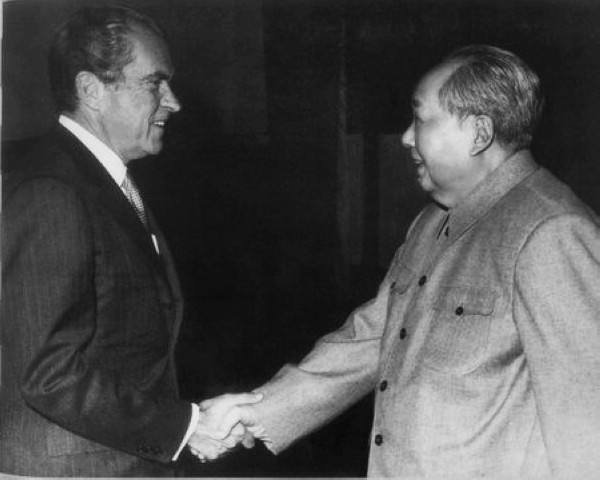Three, Russia and China:
三、俄國與中國:
Russia and China have been at odds since the first Russian explorers made it through to the Pacific Ocean in the late 1600's.
俄國和中國的摩擦從俄國探險者在17世紀晚期穿過太平洋時就開始了
In the 20th centry the Soviet Chinese relationship was complicated by Stalin's lukewarm support from Mao Zedong in the 1920's
在20世紀蘇中關系由于20世紀20年代斯大林對毛澤東的不冷不熱的支持而變得復雜
but as a Russian Stalin had no desire to have China as an enemy and he had no guarantee that Mao would effectively defeat Chiang Kai-Shek.
但是作為俄國人,斯大林并不想讓中國變成敵人,另外他也無法確定毛澤東就真的能夠打敗蔣介石
When Mao assumed power in 1949 he was not called close with Stalin
當毛澤東在1949年就職掌權時也不能說他和斯大林關系很近
and his favourite term for Khrushchev was a psalm singing old priest which has got to be the worst thing one communist can call another.
他最喜歡將赫魯曉夫描述為唱著贊美詩的老牧師,這要算是一個共產黨人對其同志最糟糕的稱呼了

The Chinese had no love for Stalin but their love of tradition made them angry about de-Stalinising the USSR,
中國人并不喜愛斯大林,但他們對于傳統的偏愛讓他們對去斯大林化的蘇聯感到生氣
they started to fear that the Soviets would side with the Unites States against them,
他們開始害怕蘇聯會和美國結盟來對抗自己
of course the Soviets feared that the Chinese would side with the United States against them,
當然,蘇聯人害怕中國會和美國結盟對抗他們
especially after President Nixon reached out to the Chinese in 1971.
尤其是在1971年尼克松總統開始和中國來往之后
Four: The Red Peril.
四、紅色的危險
For at least the first half of the Cold War it was easy to see communism getting the upper hand in the world.
至少在冷戰的前半階段很容易看出共產主義在世界上占據上風
China went communist in 1949, the Korean war of 1950 1953 was a draw, but a very bloody one.
中國在1949年由共產黨掌權,1950到1953年朝鮮戰爭算是個平手,但是十分血腥











